| Srl | Item |
| 1 |
ID:
140299
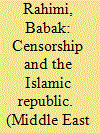

|
|
|
|
|
| Summary/Abstract |
This article focuses on censorship in Iran and offers an overall view on the control of information through complex regulatory and cultural practices that make media production possible under the Islamic Republic. In contrast to conventional views of censorship as simply restricting content, this article defines two types of regulatory measures: reactive and proactive. It is argued that the latter is distinctive since it generates an environment that establishes pervasive control of what individuals or groups may be able to say or do in a public setting.
|
|
|
|
|
|
|
|
|
|
|
|
|
|
|
|
| 2 |
ID:
140298
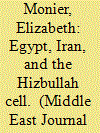

|
|
|
|
|
| Summary/Abstract |
This article argues that anti-Shi‘ism is simply one component in a strategy to justify and enforce Egypt’s security policies and regional leadership goals. An examination of Egyptian press coverage of the 2009 discovery of a Hizbullah cell in Egypt illustrates a process through which Shi‘ism is initially identified as a sectarian threat, but then “de-Arabized” through linkage with Iran. Despite being an Arab organization, Egyptian media portray Hizbullah as a non-Arab challenge to the Arab world’s stability, more than a Shi‘i challenge to Sunnism or a security threat. This indicates that Egypt’s traditional foreign policy of defending Arab interests is more important than sectarianism in conceptualizing threats to its security.
|
|
|
|
|
|
|
|
|
|
|
|
|
|
|
|
| 3 |
ID:
140302
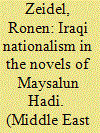

|
|
|
|
|
| Summary/Abstract |
This article discusses the work of Maysalun Hadi, one of Iraq’s most prominent women novelists. Throughout her work, Hadi’s books deal with themes of Iraqi national identity and nostalgia for the glory days of pan-Arabism that are consistent with the country’s pre-2003 ruling Ba‘thist ideology. Yet, reading and analyzing her works offer a more comprehensive and nuanced look at this identity, including a limited acceptance of pluralism along with solidarity with the “Iraqi resistance.”
|
|
|
|
|
|
|
|
|
|
|
|
|
|
|
|
| 4 |
ID:
140301
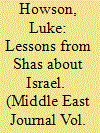

|
|
|
|
|
| Summary/Abstract |
This article focuses on the Israeli ethno-religious party Shas and its role in the Israeli social and political structure. It is argued that while Shas functions successfully in Israel’s Western-style political system, it does so as a more typical “Middle Eastern” party. Thus understanding the context within which Shas operates and its relation to political and societal divisions offers an insight into Israeli society and its political system.
|
|
|
|
|
|
|
|
|
|
|
|
|
|
|
|
| 5 |
ID:
140300
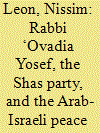

|
|
|
|
|
| Summary/Abstract |
One of the prominent religious parties in Israel, intimately involved in political decision-making, has been the Shas party, led by the late Rabbi ‘Ovadia Yosef. This article examines four components of Rabbi Yosef’s political stance: (1) his view of Jewish religious law as a factor that moderates the force of changes of seemingly historical and revolutionary significance; (2) his opposition to radical messianism; (3) his desire to adopt independent positions; and (4) his role in the development of a Mizrahi, ultra-Orthodox stream of Zionism.
|
|
|
|
|
|
|
|
|
|
|
|
|
|
|
|